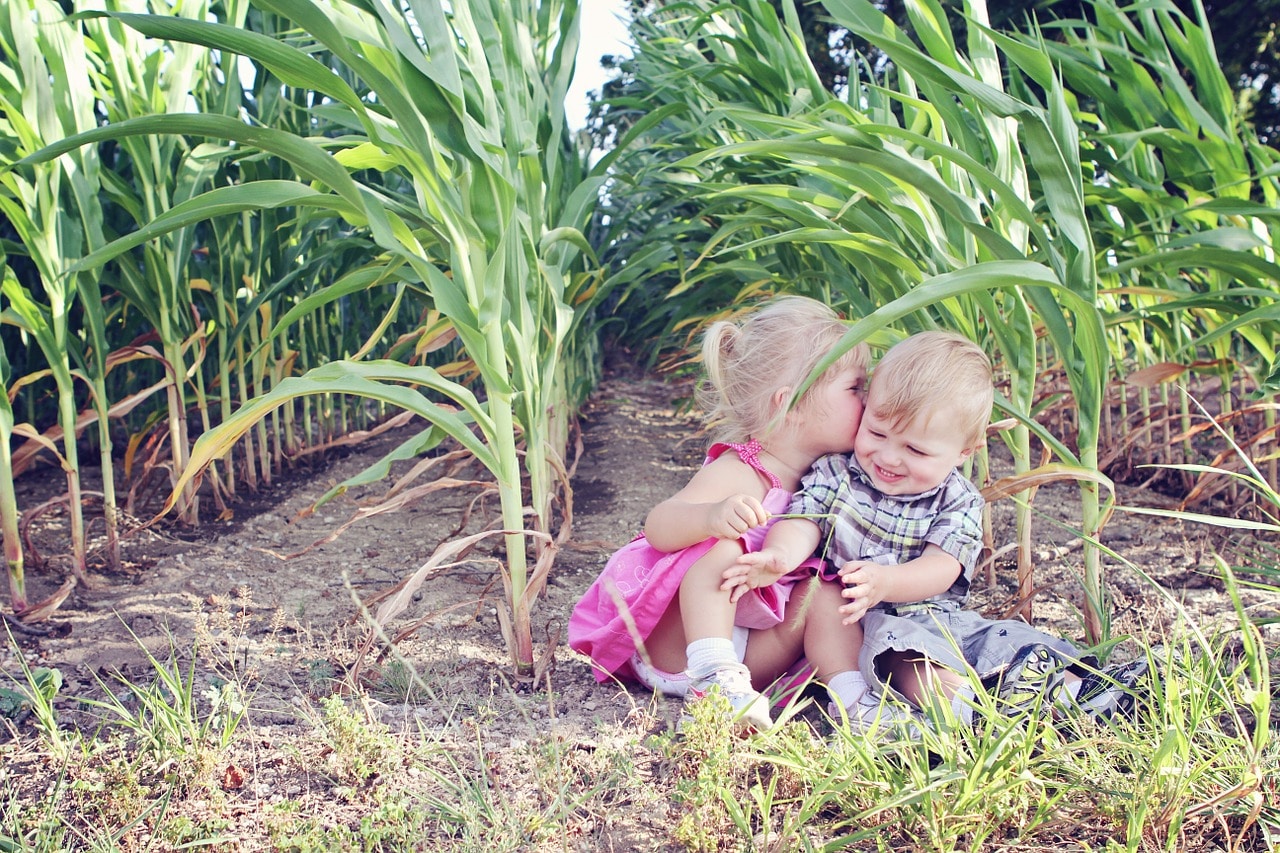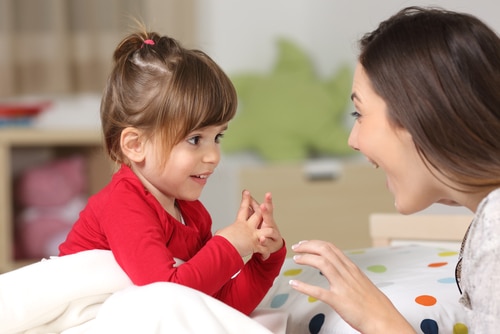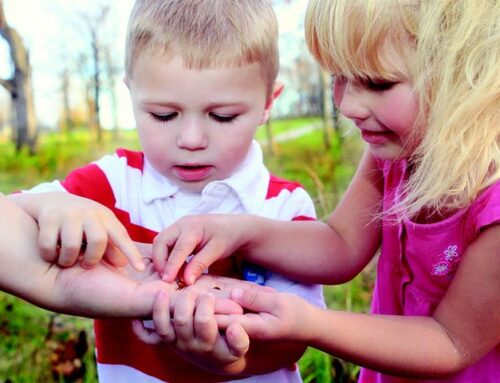By now, you’ve either faced the ‘terrible twos’ or are running into the threenager years, or both. I personally don’t agree with the term ‘terrible’ but definitely am starting to see the challenges with my own son and have a new found respect for parents!
For now, that’s enough about my views and experiences thus far. Let’s talk about how a three year old’s language should be developing. And more importantly, how we can help our little munchkins get to these milestones.
If you find your child is not hitting many of the three-year old milestones, you may want to visit our previous post that discusses how to help a two year old.

Please remember all children develop at their own pace. This post is designed to help your child, if you do have any concerns. It may also be helpful for parents who are out of ideas on how to continue to help develop language skills.
Here are some of the key skills that we look for in children by the time they turn three:
Receptive Language
Receptive language is the ability to understand words and language. It involves understanding words, sentences and meaning of what is said or read. Receptive language is a key foundation skill of overall language development. Children with receptive language delay can have difficulties at home, school and at work.
Target |
How you can help your child |
|---|---|
|
Follow 2-step unrelated directions |
Give your child opportunities to follow 2-step instructions. Ask your child to help set the dinner table, unload the dishwasher, etc. Provide unusual instructions during these tasks e.g. ‘clap your hands and then put a spoon away’. If testing whether they can follow the instruction, ensure that you are not accompanying the instruction with a gesture or eye-gaze that may support understanding of the instruction. This can be used as a support strategy however. |
|
Understand concepts |
Use the child’s toys to talk about these concepts and demonstrate their meaning. For example, have 2 different size measuring cups. Talk about which one is bigger / smaller. Use them to pour water (on some toy animals and talk about them being wet. Use a towel to dry the toys and compare the feeling of wet and dry. Then make the animals have a race and see which one is fast / slow.
|
|
Recognise simple named colours |
Play games that require your child to sort objects based on colours. Each time, name the colour. Point out different coloured cars on the road; talk about the colours of the fruit and vegetables at the shops. |
|
Understand ‘who’, ‘what’ and ‘where’ questions |
Ask your child simple ‘who’, ‘what’ and ‘where’ questions. Provide choices e.g. ‘is it grandma or grandpa?” Offer the appropriate answer if your child is unable to respond. A 3 year old is expected to respond to the question with an appropriate word (e.g. a person’s name if asked a ‘who’ question; a specific location if asked a ‘where’ question. If your child tends to respond with ‘there’, it may indicate some difficulties with vocabulary use.
|

Expressive Language
Expressive language refers to the child’s ability to generate language to communicate their needs and wants. It involves the use of gestures, words, sentences and writing to interact with others. Research shows a strong link between receptive and expressive language abilities, and a child’s later development of literacy skills.
Target |
How you can help your child |
|---|---|
|
Use 3-4 word sentences with a |
Support your child’s language development by adding one more key word. For example: Child: big lion Ensure you are adding a range of word types when building on sentences. Use describing words (including colour, size, feelings, etc.), action words, location words, etc. |
|
Begin to use basic grammar |
Ensure you are always using correct grammar. It is often cute when a 2 or 3-year old uses simplified grammar. However, if we don’t’ provide the correct models, our children are less likely to use them. Don’t make a big deal of any errors – just say the sentence back with the correct grammar. For example: Child: look, I jump |
|
Talk about things that are not in |
Ask your child about their day at day-care or an outing with friends / grandparents / aunties & uncles. Help support the conversation with asking ‘who’, ‘what’ and ‘where’ questions rather than yes / no questions. |
|
Enjoy telling stories and asking questions |
At this age, a child’s story will typically have no organisation. Encourage your child to tell you about their day at the farm or about their favourite book. Use toys to act out stories.
|
|
Ask “who”, “what” and “where” questions |
Encourage your children to ask questions and respond to them appropriately. Play hiding games that encourage your pre-schooler to ask what you found / where you found it |
Some more tips for expressive language
Target |
How you can help your child |
|---|---|
|
Be understood by unfamiliar adults 60% of the time |
Clarity can be impacted by a number of factors including sound errors, a child’s volume being too soft and / or children talking too fast. If volume or speed are issues, encourage your pre-schooler to adjust their rate or volume accordingly. Feel free to contact me for a fun visual sheet that can help children understand these concepts better. |
|
Use a range of sounds in words: |
Your pre-schooler should be correctly using most of these sounds in different positions (start, middle, end) of a word. Some errors are considered to be age-appropriate whilst other are not developmental. If unsure, please contact a speech pathologist to get a sense of whether there is a need for concern. Always say words back correctly to your pre- schooler and do not put pressure on him / her to repeat the word/s. |
|
Play begins to represent less familiar events |
Ensure your pre-schooler has toys that enable play and language development. Pretend play toys (e.g. tea sets, doctor’s kit, dress-ups, Duplo blocks, etc) are all great ways to expand a toddler’s imagination, while developing their play and language skills. Play with your child and demonstrate how the toys can be used to pretend. |
General Strategies
- Consider a hearing test, especially if your toddler has a history of recurrent ear infections and / or colds.
- Get down to your child’s level ensuring that they can see your eyes and face.
- I frequently catch my mum telling my son “let’s go wash hands” with me repeatingback ‘go and wash your hands’. While it’s cute at this age, we don’t want a 12 year old saying ‘I need to wash hands’. Please remember to use grammatically correct sentences with your child, even if the sentences are short.
- Use lots of specific praise when your child makes any attempts. This tells the child that you are listening and exactly what skill you are aiming for and gives them a reason to try again.
- Read to your child as often as possible. Books are a great way to teach new vocabulary and concepts. You don’t need to stick to the story in the book. Use the opportunities to ask and answer questions.
- Remember to ask open-ended questions that cannot be responded to with a yes / no response.

You may want to seek professional input from a speech pathologist if your child:
- Uses short sentences (2-word phrases)
- Doesn’t understand / follow 2-step instructions
- Does not play with other children
- Does not respond to questions
- Doesn’t ask questions
- Is difficult to understand by less familiar people
How we can help:
If you find these strategies are not helping your child progress, you may want to contact a speech pathologist. At Chatterbox Speech Pathology, based in Stirling, we can provide lots of practical strategies to help support language development. Our assessments provide insightful information about the things your little one is great at and areas that we can support. We make therapy fun for the child and give parents realistic goals to consolidate at home with practical ideas on how to develop the goals. We provide parent coaching to increase your ability to support your child.
If you would like any further information, please feel free to contact Kunali on 0405 176 931 or Email me.
I hope you have found some useful information about getting your three year old talking in no time. Next week, we will discuss what to do for your four year old. Have a terrific week!
If you would like a downloadable copy of this blog, please click here.
Stay updated when we add a new blog. Subscribe HERE





